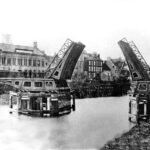24 September 1862: Having bet his shirt on blockade-running to the Confederates, Hull mayor Zachariah Pearson tells of his ruin by Lombard Street and Abraham Lincoln
Times. 1864/02/06. Court of Bankruptcy, Basinghall Street, Feb. 5. London. Get it:
.Unedited excerpt
If an excerpt is used in the book, it will be shorter, edited and, where applicable, translated.
I began life as a sailor-boy, and I afterwards became master of a ship. Subsequently, I started in business as a merchant and shipowner… During the last two years of my trading it was an uniform course with me to mortgage ships as I purchased them. On one occasion (in May, 1861) I purchased from Messrs. Overend and Gurney seven vessels for £88,000, payable by instalments. I gave Messrs. Overend and Co. mortgages upon the vessels as security for the payment of the purchase money. In consequence of the rise in the rate of insurance upon vessels bound to American ports, from 15 to 60 per cent, I was compelled to borrow money from Messrs. Overend and Co. for the purpose of meeting payments… In April, 1862, I purchased from Messrs. Overend and Co. the Cumberland and the Merrimac for £55,000. I undertook to pay Messrs. Overend and Co. £10,000 in cash and £45,000 by bills. In April, 1862, Messrs. Overend and Co. advanced me £35,000 upon the freights of six vessels. In June or July, 1882, I discounted with Messrs. Overend £10,000 of bills drawn upon [Henry?] Briggs. At that time I was desirous of effecting additional insurances, and I wanted the money. I gave Messrs. Overend security upon the goods which I had purchased from creditors, and which were in the vessels mortgaged. Messrs. Overend and Co. have relinquished their security upon the goods in favour of Messrs. S. Smith, Brothers, and Co. in relief of a security which they held.
I have been in the habit of drawing bills upon Mr. Loft, of Hull. I deposited with Mr. Loft shares and other securities. I undertook to take up the bills, and Mr. Loft held the securities in order that he might revert to them in case I failed in my promise. I have had similar transactions with Mr. Briggs, who was reputed to be a wealthy man, but who is now a bankrupt in the Hull Court. Mr. Briggs was formerly an underwriter; he afterwards became a dealer in money. I am not aware that the estate of Briggs has produced any dividend. I gave a commission of 1 or 2 per cent to Briggs for his acceptances. Messrs. Newman and Co. also accepted bills for me. Mr. Henry John Barker introduced me to Mr. W.A. D’Ogherty, who stated himself to be a member of the firm of Newman and Co. Messrs. Pease and Co. wrote to me after the bankruptcy, stating that they were unable to find Messrs. Newman and Co. or either of the partners in that firm. Mr. Barker said that Mr. D’Ogherty was connected with a Spanish prince who had been out of favour at court; that Mr. D’Ogherty had been the means of reinstating this prince, and that in consequence he had come into possession of a large sum of money. I had previously a transaction with D’Ogherty individually. I drew upon him, and he accepted. I suppose I gave D’Ogherty a commission for accepting for me; he would not accept without some remuneration. I admit that Mr. Barker did not introduce me to D’Ogherty as a member of the firm of Newman and Co. I gave Messrs. Newman and Co. no security in respect of the bills (produced) accepted by them. I paid a commission of 1 per cent. to Mr. D’Ogherty. I have not been able to ascertain whether there is a firm of Newman and Co. I always understood that Mr. D’Ogherty was himself Newman and Co.
In August, 1862, I placed my affairs in the hands of Messrs. Lawrance and Co., and I delivered my books to Messrs. Coleman and Co., the accountants. Messrs. Overend and Co. took offence at this time in consequence of the dishonour of certain bills of Pilkington. They declined to give me the necessary assistance, and I was compelled to succumb. Messrs. Overend and Co. have behaved very well in this matter; they offered 8s. in the pound to my creditors. I am of opinion that if I had been allowed to continue nay business I should have recovered a very large sum of money from the Confederate Goverment – a sum sufficient for payment of all my debts in full. As it is, the estate has been ruined, and the vessels have been sold for very little.
I have heard that Mr. Dobson, one of the assignees, is in pecuniary difficulties. Mr. Hall, another of the assignees, supplied the gunpowder consigned to America; Mr. Westmoreland insured one of the vessels; and Mr. Samuelson, the fourth assignee, had a “little interest” in the consignments – in short, all the assignees of my estate were more or less connected with the adventures to America. Fifty-three creditors voted in the choice of assignees.
[Minor post-filing transactions. Betrayal by Mr. Pease, banker, of Hull.]
My balance-sheet shows that I owe large sums to the captains of the Modern Greece, Circassian, Anne, Phoebe, and other vessels engaged in the adventures to America. During the four months immediately preceding my steppage my renewals of bills amounted to £132,000. The number of bills current very much increased during the last few months of my trading.
[The post-bankruptcy sale of the Rappahannock. A donation for Beverley Road Wesleyan Chapel, Hull.]
Once I was Sheriff of the borough of Hull, and twice I have filled the office of Mayor. I am now 42 years of age. During seven months of the year 1862 I lost £120,000. On one day in June I received information of the loss of three vessels. From The Times I learnt that one of my ships, the Indian Empire, had been burnt to the water’s edge in the Thames. By the Modern Greece I lost £30,000, and by the Patras £15,000, all on the same day. My aggregate loss by these vessels was £80,000. During the year 1862 six of my vessels were captured by Federal cruisers. I despatched my ships to the American ports upon the faith of the proclamation by President Lincoln. I had previously ascertained that other persons had realized considerable profits from similar transactions – in some instances the profits would be 300 or 400 per cent… I was congratulated by some of my creditors upon the successful running of the blockade by the Stettin; but the news did not prove to be true. (A laugh.)
Comment
Comment
This remarkable testimony is from the drawn-out bankruptcy process, but Pearson had resigned as mayor at the beginning of October 1862, and his reputational ruin was achieved a week before, when on 24 September 1862 he filed for bankruptcy (Sheffield Independent 1862/10/02). (Some secondary sources give 23 September. Why?)
The shipowner Stefanos Xenos believed that Pearson was lured into the clutches of the City of London, not because of any possible benefit to either Xenos’ Greek & Oriental Steam Navigation Company or for Pearson’s business, but simply to generate revenues for the bankers involved:
Mr. Zachariah Pearson had, at that time, no steamers mortgaged to Messrs. Overend, Gurney, and Co. except the Chersonese, which was already paid off. Knowing that his credit was good at Hull, with Smith Brothers, his bankers, the great capitalists sent for and asked him to buy a portion of my fleet.
“I cannot,” said Mr. Pearson.
“You will not be asked to pay any cash,” said Edwards; “you need only give your acceptances.”
“I am already overworked,” said Pearson.
“It will be a good thing for you, Pearson,” said the official assignee.Mr. Pearson still hesitated; in fact, he did not like to enter into the transaction at all. They, however, talked him over, and he at last agreed to meet Edwards at the office of Messrs. Crowder and Maynard, the solicitors, in order to complete the transaction at once, as Messrs. Overend, Gurney, and Co. were most anxious to have the bills that day. On the way to Coleman Street, Mr. Pearson began to change his mind, so that when he had arrived at the solicitors’ office, he told Edwards that he was not at all inclined to carry out the transaction. On hearing this Edwards looked terribly disappointed, and after a short silence said, “Pearson, come and speak with Mr. Gurney.” On their arrival at Lombard Street, Pearson went into the little room facing Birchin Lane, whilst the adviser went direct to Mr. H.E. Gurney to give him counsel in the matter.
After the lapse of a short time both the capitalist and the disposer of the capital entered the room where Pearson was.
“Now, friend Pearson, what is the matter again?” said Mr. Gurney. A further debate on the subject ensued, and after a short time they brought Pearson round again, and then Mr. Gurney said to him: “Friend Pearson, I will give you, on the spot, a cheque for £500, if you will sign the acceptances and complete the business to-day. Bois, draw a cheque for £500 for Mr. Pearson.”
The cheque was handed to Mr. Zachariah Pearson. The official assignee gave him his word of honour that he had nothing to fear on account of this noble transaction. Mr. Henry John Barker, the favourite, secundus, of Mr. David Ward Chapman, was also regaled with a cheque, in compensation for his trouble in drawing the bills of exchange. Edwards and Pearson returned at once to the lawyers’, where he signed the mortgages and accepted the bills. Edwards then took the acceptances, and, like a Don Cossack, started with them for the “Corner House,” where arrangements had been previously made to discount them with some melting-house.
“This is my death-warrant,” sighed poor Pearson.
“Not at all. It’s all right,” said Edwards, his smooth face irradiated with a smile.
Oh, glorious English “All right!” How multitudinous are your meanings – how complex your significations!
Scarcely had Pearson left the lawyers’ when Edwards hastened after him.
“Hallo! I say, Pearson,” cried out the smoothfaced worthy, “what are you going to give me for this capital job I’ve done for you?”
“Capital job!” said Pearson; “I call it my ruin. I have no trade to employ all these steamers. It will be my ruin, I say.”
“Not at all, not at all. All right, I tell you. You have to thank me for putting you in the hands of Overend, Gurney, and Co. They will make you one of the greatest men in England.”
This modern Rhadamanthus called into play all his eloquence and logic to prove to Zachariah Pearson that his share of the transaction was worth £1,000.
Poor Zachariah Pearson! I have it from his own lips that the same day he gave Edwards a cheque for £1,000, double the bonus he had himself received. Verily, verily, Mr. Edwards knew how to trim his sails so as to catch the wind from whatever point it blew.
The intrigues of that “Corner House” were more than fiction would dare to fancy. As a sequel to the above transaction, I shall here mention that Mr. Edwards pressed, and even worried, Mr. Pearson to take a brother of his (Edwards’s) into partnership. Entangled as Pearson was in the Lombard Street meshes, he resolutely declined this honour, exhibiting in his refusal more determination than I had shown on a somewhat similar occasion.
Whatever commissions the above-named two gentiluomini, Barker and Edwards, were paid for the job, were added, of course, to the price of the steamers.
It is said that Bishop Roquette was the original of Molière’s Tartuffe. Can any one tell me, in this Lombard Street comedy, amongst so many, which is the real Tartuffe?
“What does all this mean?” I said to my bookkeeper, Ross, when, having returned to my office in despair, I told him of the breaking up of our line.
“It means,” he said, looking up from his desk, and speaking in a low voice – “it means, perhaps, that they want money themselves.”
I asked whether he had any grounds to think they did want money.
“Yes,” he said; “it’s the opinion of Mr. March, Edwards’s confidential clerk. In making up the books this year, and going through the accounts, he came to the conclusion that the firm is in want of means – they are not right. But, pray, do not speak of it; do not mention my name.”
(Xenos 1869)
The fraud perpetrated by Docherty on Pearson with the connivance of Barker is a precursor of the Nigerian Article 419 scam, which you will know from your inbox. Do read the entire chapter on Zachariah Pearson and the “evil hour” in which he came under the influence of Henry Barker. For context for Pearson, Xenos et al, read W.T.C. King’s excellent history of the London discount market (King 1972).
The Pease family (as in Messrs. Pease (and Hoare?)) were implicated in the failure of Overend, Gurney and Company, which led directly to the great financial panic of 1866 and indirectly to the Reform Act 1867. OGC was the last UK bank to fail until Northern Rock in 2007, one of whose directors was Nicola Pease:
What [the statement announcing the appointment of Nicola Pease as the FTSE 250 company’s chairwoman] omitted to mention was Ms Pease’s role as a non-executive director at Northern Rock from 1999 right up to the effective collapse of the bank in September 2007. Northern Rock, of course, became a byword for financial mismanagement. Footage of anxious savers queueing round the block in the first run on a British bank since Victorian times were beamed around the world. Shareholders were wiped out; 2,500 people lost their jobs; taxpayers had to foot the bill for a nationalisation that the National Audit Office would say later could cost as much as £2 billion. MPs on the Treasury select committee found Northern Rock’s directors to be “the principal authors” of the debacle, pursuing “a reckless business model which was excessively reliant on wholesale funding” (Hosking 2019/11/12).
Plus ça change?
Which proclamation by Abraham Lincoln? I’ve read somewhere that Pearson was prepared to offend Hull’s traditional abolitionism in order to get its cotton mills going again.
Something to say? Get in touch
Similar
 1 July 1840: The opening of the Hull and Selby Railway terminates the threat to Hull’s port from Goole, Scarborough and Bridlington
1 July 1840: The opening of the Hull and Selby Railway terminates the threat to Hull’s port from Goole, Scarborough and Bridlington 24 November 1839: Betsy Sawyer, a freed Antiguan slave, and family servant to the Rev. Thomas Murray, dies at Yeadon
24 November 1839: Betsy Sawyer, a freed Antiguan slave, and family servant to the Rev. Thomas Murray, dies at Yeadon 24 August 1921: The British-built United States Navy R.38 airship collapses, explodes, and crashes into the Humber at Hull, killing 44 of the 49 crew
24 August 1921: The British-built United States Navy R.38 airship collapses, explodes, and crashes into the Humber at Hull, killing 44 of the 49 crew
Comment
Comment
A vision of globalising businessmen slavering at the thought of labour potentially available to “the nation that loves the black man,” at a fraction of Yorkshire prices.
Clarification welcome re W.E. Forster’s comments on cotton – “one raw material, the restriction of which was threatening this country just now with one of the greatest disasters that could occur.” Here‘s the average cotton price at Liverpool 1811-1900, so he’s presumably talking about some perceived threat:

Original: “As to the cleansing of cotton, he found on the west side that the natives used their fingers at only; but on the west side they used an iron roller to separate the pile from the seed.” I think he meant east/west.
Something to say? Get in touch
Search
Donate
Music & books
Place-People-Play: Childcare (and the Kazookestra) on the Headingley/Weetwood borders next to Meanwood Park.
Music from and about Yorkshire by Leeds's Singing Organ-Grinder.



 Bluesky
Bluesky Extwitter
Extwitter